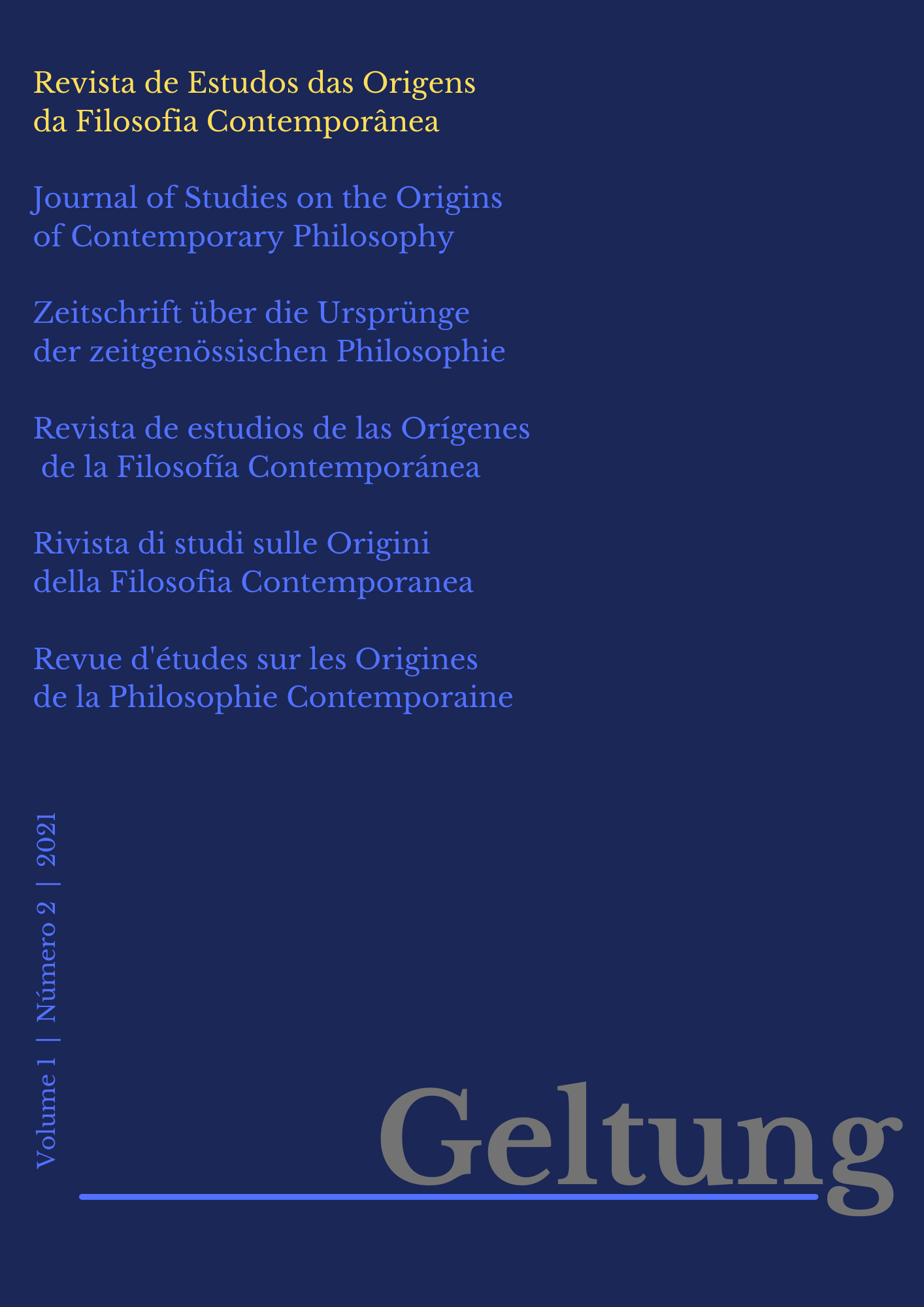Outro caminho de Davos:
a crítica de Cavaillès à Logische Syntax der Sprache de Carnap
DOI:
https://doi.org/10.23925/2764-0892.2021.v1.n2.e57081Palavras-chave:
Davos, Jean Cavaillès, Rudolf Carnap, Relativizado a priori, Naturalismo TranscendentalResumo
Em A Parting of the Ways, Friedman narra o debate de Davos como um catalisador na gênese de duas trajetórias divergentes na filosofia do século XX. Neste artigo, apresento um participante do debate de Davos, Jean Cavaillès, que não adere à bifurcação de Friedman e que soube ziguezaguear entre os desenvolvimentos da fenomenologia e do positivismo lógico. Para mostrar como esse epistemólogo francês foi capaz de conectar essas duas tradições, detalho o encontro de Cavaillès com o Círculo de Viena, explico seu kantismo e registro o lugar de Bolzano em seu relato do desenvolvimento (histórico) da filosofia da ciência. Depois disso, examino a crítica de Cavaillès à Logische Syntax der Sprache de Carnap e argumento que a teoria da ciência de Cavaillès está muito mais próxima da análise lógica de Carnap do que ele mesmo ou a literatura secundária sugere. Ambos os filósofos, de fato, defendem a importância de construir a unidade da ciência, afirmam o desenvolvimento autônomo da ciência e conceituam uma noção dinâmica do a priori. Na conclusão, exponho as semelhanças entre a conceituação de Cavaillès do a priori dinâmico e o a priori relativizado de Friedman, e defendo a importância de estender o relato de Friedman sobre os desenvolvimentos entre guerras na filosofia da ciência.
Referências
Awodey, Steve and Klein, Carsten, eds. 2004. Carnap brought home: The view from Jena. Volume 2. Chicago: Open Court. .
Benis Sinaceur, Hourya. 1987. "Lettres inédites de Jean Cavaillès à Albert Lautman." Revue d'histoire des sciences. 40 (1): 117-128.
Benis Sinaceur, Hourya. 2006. “From Kant to Hilbert: French philosophy of concepts in the beginning of the XXth century.” In The Architecture of Modern Mathematics: Essays in History and Philosophy, eds. José Ferreirós and Jeremy J. Gray, 349-376. Oxford: Oxford University Press.
Benis Sinaceur, Hourya. 2013. Cavaillès. Paris: Société d’éditions Les Belles Lettres.
Boirel, René. 1964. Brunschvicg: sa vie son oeuvre, avec un exposé de sa philosophie. Paris: Presses Universitaires de France.
Bouveresse, Jacques. 2012. À temps et à contretemps: Conférences publiques. Paris: Collège de France.
Brenner, Anastasios. 2014. Epistemology Historicized: The French Tradition. In New Directions in the Philosophy of Science. The Philosophy of Science in a European Perspective, volume 5, eds. M. Galavotti, D. Dieks, W. Gonzalez, S. Hartmann, T. Uebel, M. Weber, 727-736. Dordrecht: Springer.
Canguilhem, Georges. 1966/1991. The Normal and the Pathological. Trans. Carolyn R. Fawcett and Robert S. Cohen. Cambridge, MA: MIT Press.
Carnap, Rudolf. 1931. “Überwindung der Metaphysik durch logische Analyse der Sprache.” Erkenntnis 2: 219–241.
Carnap, Rudolf. 1934/1937. The Logical Syntax of Language. London: Routledge & Kegan Paul.
Carus, André W. 2007. Carnap and Twentieth-Century Thought: Explication as Enlightenment. Cambridge: Cambridge University Press.
Cassou-Nogués, Pierre. 2001. De l’expérience mathématique. Essai sur la philosophie des science de Jean Cavaillès. Paris: Libraire Philosophique J. Vrin.
Cavaillès, Jean. 1929/2021. ‘The Second Davos Conference.” Trans. Robin MacKay. https://www.urbanomic.com/document/davos/
Cavaillès, Jean. 1932. “Un mouvement de jeunesse en Allemagne.” Annales de l’Université de Paris, 7 (2): 148-174.
Cavaillès, Jean. 1935. “L'École de Vienne au congrès de Prague.” Revue de Métaphysique et de Morale 42 (1): 137-149.
Cavaillès, Jean. 1938a/1994. Remarques sur la formation de la théorie abstraite des ensembles. In Oeuvres Complètes de Philosophie des Sciences, ed. Bruno Huisman. Paris: Hermann.
Cavaillès, Jean. 1938b/1994. Méthode axiomatique et formalisme. In Oeuvres Complètes de Philosophie des Sciences, ed. Bruno Huisman. Paris: Hermann.
Cavaillès, Jean. 1946/2020. “Mathematical Thought.” Trans. Robin MacKay. https://www.urbanomic.com/document/mathematical-thought/
___. 1947/2021. On Logic and the Theory of Science. Trans. Robin Mackay and Knox Peden. Cambridge, MA: MIT Press.
Cavaillès, Jean and Lautman, Albert. 1946. “La pensée mathématique (en collaboration avec Albert Lautman).” Bulletin de la Société française de philosophie 40: 1-39.
Cavaillès, Jean and Noether, Emmy. 1937. "Briefwechsel Cantor-Dedekind." Actualités Scientifiques et Industrielles 518.
Cauvin, Jean-Paul. 2014. A New Machine For Thinking: Historical Epistemology in Twentieth Century France. PhD Thesis. Emory University.
Cauvin, Jean-Paul. 2020. "From Phenomenology to the Philosophy of the Concept: Jean Cavaillès as a Reader of Edmund Husserl." HOPOS: The Journal of the International Society for the History of Philosophy of Science 10 (1): 24-47.
Chimisso, Cristina. 2016. Writing the History of the Mind: Philosophy and Science in France, 1900 to 1960s. London: Routledge.
Cortois, Paul. 1993. Paradigm and Thematization in Jean Cavaillès’ Analysis of Mathematical Abstraction. In Proceedings of the XVth International Wittgenstein Symposium, vol. 1: The Philosophy of Mathematics, eds. J. Czermak, 343-350. Vienne: Holder-Pichler-Tempsky.
Cortois, Paul. (2020). “Bibliographie de Jean Cavaillès établie le 10 juillet 2018.” Revue de métaphysique et de morale 2 (2): 209-229.
Dosse, François. 1997. History of Structuralism: The Rising Sign, 1945-1966. Volume 1. Minneapolis: University of Minnesota Press.
Engel, Pascal. 2007. “Vies parallèles: Rougier et Cavaillès.” Philosophia Scientiæ 7: 19-48.
Ferrières, Gabrielle. 1982/2000. Jean Cavaillès: A Philosopher in Time of War, 1903-1944. Trans. T. N. F. Murtagh. New York: Edward Mellen Press.
Fraenkel, Abraham. 1930. "Georg Cantor." Jahresbericht der Deutschen Mathematiker-Vereinigung 39: 189–266.
Friedman, Michael. 1999. Reconsidering Logical Positivism. Cambridge: Cambridge University Press.
Friedman, Michael. 2000. The Parting of the Ways. Chicago: Open Court.
Friedman, Michael. 2001. Dynamics of Reason: The 1999 Kant Lectures at Stanford University. Stanford, CA: CSLI.
Friedman, Michael, and Creath, Richard, eds. 2007. The Cambridge Companion to Carnap. Cambridge: Cambridge University Press.
Gordon, Peter. 2010. Continental Divide: Heidegger, Cassirer, Davos. Cambridge, MA: Harvard University Press.
Granger, Gilles-Gaston. 1963/1983 Formal Thought and the Sciences of Man. Trans. Alexander Rosenberg. Boston: Boston Studies in the Philosophy of Science.
Granger, Gilles-Gaston. 1996. “Jean Cavaillès et l'histoire.” Revue d'Histoire des Sciences 49 (4): 569-582
Halimi, Brice. 2020. "Logic, Cavaillès’s sought-after science." Revue de metaphysique et de morale 2: 145-164.
Hallward, Peter and Peden, Knox, eds. 2014. Concept and Form, Volumes 2. London: Verso Books.
Heidegger, Martin. 1927/2010. Being and Time. Trans. Joan Stambaugh. Albany: Suny Press.
Herrigel, Hermann. 1929. “Denken dieser Zeit: Fakultäten und Nationen treffen sich in Davos.” Frankfurter Zeitung, April 22, 1929, Abendblatt, 4.
Husserl, Edmund. 1929/1969. Formal and Transcendental Logic. Trans. Dorion Cairns. The Hague: Martinus Nijhoff.
Hyder, David (2003). “Foucault, Cavaillès, and Husserl on the historical epistemology of the sciences.” Perspectives on science 11(1): 107-129.
Kuhn, Thomas. 1962/2012 The Structure of Scientific Revolutions. Chicago: University of Chicago Press.
Lawlor, Leonard. 2002. Derrida and Husserl: The Basic Problem of Phenomenology. Bloomington: Indiana University Press.
Lecourt, Dominique. 1981. L’ordre et les jeux. Le positivisme logique en question. Paris: Grasset.
Limbeck-Lilienau, Christoph. 2007. A Second Appraisal: New French Literature on Logical Empiricism. In Otto Neurath's Economics in Context. Vienna Circle Institute Yearbook, volume 13, eds. E. Nemeth, S.W. Schmitz, T.E. Uebel, 183-195. Dordrecht: Springer.
Longuenesse, Béatrice. 1993/2001. Kant and the Capacity to Judge: Sensibility and Discursivity in the Transcendental Analytic of the "Critique of Pure Reason". Trans. Charles T. Wolfe. Princeton: Princeton University Press.
Michel, Alain. 2020. "Jean Cavaillès dans l’héritage de Léon Brunschvicg: la philosophie mathématique et les problèmes de l’histoire." Revue de metaphysique et de morale 1: 9-36.
Neurath, Otto. 1931. “Physicalism: The Philosophy of the Viennese Circle.” The Monist 41 (4): 618–623.
Peden, Knox. Spinoza Contra Phenomenology: French Rationalism from Cavaillès to Deleuze. Stanford: Stanford University Press.
Peña-Guzmán, David M. 2020. “French historical epistemology: Discourse, concepts, and the norms of rationality.” Studies in History and Philosophy of Science Part A 79: 68-76.
Quine, W. V. (1951). “Main Trends in Recent Philosophy: Two Dogmas of Empiricism.” The Philosophical Review 60 (1): 20-43.
Thompson, Kevin. 2008. Historicity and transcendentality: Foucault, Cavaillès, and the phenomenology of the concept. History and Theory 47 (1): 1-18.
Ramirez, Santiago. 1986. “Jean Cavaillès and the Vienna Circle.” Grazer Philosophische Studien 27 (1): 155-176.
Reichenbach, Hans. 1920/1965. The Theory of Relativity and A Priori Knowledge. Berkeley: University of California Press.
Schöttler, Peter. 2015. "From Comte to Carnap. Marcel Boll and the Introduction of the Vienna Circle." Revue de Synthèse 136 (1–2): 207–36.
Soames, Scott. 2014. Analytic Philosophy in America. Princeton: Princeton University Press.
Soulez, Antonia. 2015. “La réception du Cercle de Vienne aux congrès de 1935 et 1937 à Paris ou le « style Neurath ».” In L’épistemologie française 1830-1970, eds. Mitchel Bitbol and Jean Gayon, 31-66. Paris: Éditions matériologiques.
Tarski, Alfred. 1935. “Der Wahrheitsbegriff in den formalisierten Sprachen.” Studia Philosophica 1: 261–405. Trans. by L. Blaustein.
Terzi, Pietro. 2022. Rediscovering Léon Brunschvicg’s Critical Idealism: Philosophy, History and Science in the Third Republic. London: Bloomsbury Academic.
Vuillemin, Jules. 1971. La logique et le monde sensible. Paris: Flammarion.
Wagner, Pierre, eds. 2009. Carnap's Logical Syntax of Language. Dordrecht: Springer.
Wirth, Claus-Peter, Siekmann, Jörg, Benzmüller, Christoph, Autexier, Serge. 2009. Jacques Herbrand: Life, Logic, and Automated Deduction. In Logic from Russell to Church, Volume 5, eds. Dov M. Gabbay and John Woods, 195-254. Amsterdam: Elsevier.
Wittgenstein, Ludwig. 1921/2013. Tractatus Logico-Philosophicus. Trans. Frank P. Ramsey and Charles Kay Ogden. London: Routledge.
Downloads
Publicado
Como Citar
Edição
Seção
Licença
Copyright (c) 2022 Geltung - Revista de Estudos das Origens da Filosofia Contemporânea

Este trabalho está licenciado sob uma licença Creative Commons Attribution-NonCommercial-NoDerivatives 4.0 International License.








